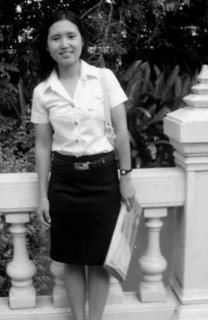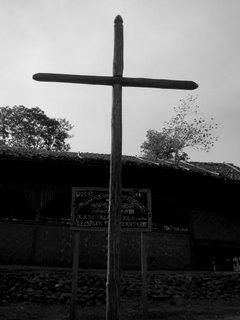Free Yourself Like a Gazelle from the Hunter

“My name is Naw Hlaing Thuzar,” she said. “But most of my friends call me Htoo Htoo.”
There began my introduction to Htoo Htoo, a bright Karen on pilgrimage to Bangkok, carving out a rough but sweet new life. Born in Karen State, Hpa-an Township inside Burma, Htoo Htoo quickly ran into the educational wall familiar to the Karen—no more funds, nor more opportunities.
With the help of a friend she reached the Thai-Burma border in the summer of 2003. He cousin Teetoh became a good friend of mine while I lived in his house and served beside him at Mae La. He introduced me to Htoo in desperation to find her the funding she needs to continue her studies. Waiting on doors to open, Htoo Htoo began serving her community by teaching Karen inside the camps. In May 2005, God opened up the door to a scholarship at the prestigious Assumption University in Bangkok.
“Only by the blessing of God did I overcome many hardships to reach this path in my life,” she notes, fully understanding the weight of her new fortune. Missionaries who visit Mae La and see the Karen often stumble under the magnitude of their plight. What to offer under such a political shadow and economic darkness? Often I wonder how much the Karen really need our words as evangelists. Far more they need education. With the Burmese government closing university options inside Burma in addition to hunting Karen and subjecting them to rape, starvation and military attics, all higher education has dried up.
Along with the blessings come the hardships. Htoo Htoo’s scholarship covers her academic courses but not the expensive Bangkok living expenses and cost of resources. She was recently blessed with a gifted used computer.
Her scholarship stipulates that Htoo Htoo must return to help her community. She would have it no other way. Supporting Htoo Htoo is not importantly only because of all the lives her education will teach, lead and instruct. A much larger ripple is the Hope it brings to the Karen. As a pastor and teacher I daily talked about Hope for the Karen. One day a favorite student Sal-Lin put his arm around me as I slipped down a rocky trail. “Teacher sir, I am most happy just that you keep coming. You never forgot us. I have hope now Americans will know and remember us.”
All of us need hope. On the frontlines you need it desperately, to see the light at the end of the tunnel and to take even small wins in the day. Htoo Htoo’s education at Assumption University explodes with the same impact as a poor Oklahoma Indian kid attending Harvard proving to his community that there is development.
“I have strongly belief that God will never ignore me whenever I need His richly blessing. I know that I cannot get any good chance by myself or I cannot do anything without Him.”
You can help. Pray for Htoo Htoo, remember the education the Karen need and when God moves your heart please donate to this cause. You can reach me: kylerallen@yahoo.com for information on giving donations directly to Htoo Htoo in Thailand.



